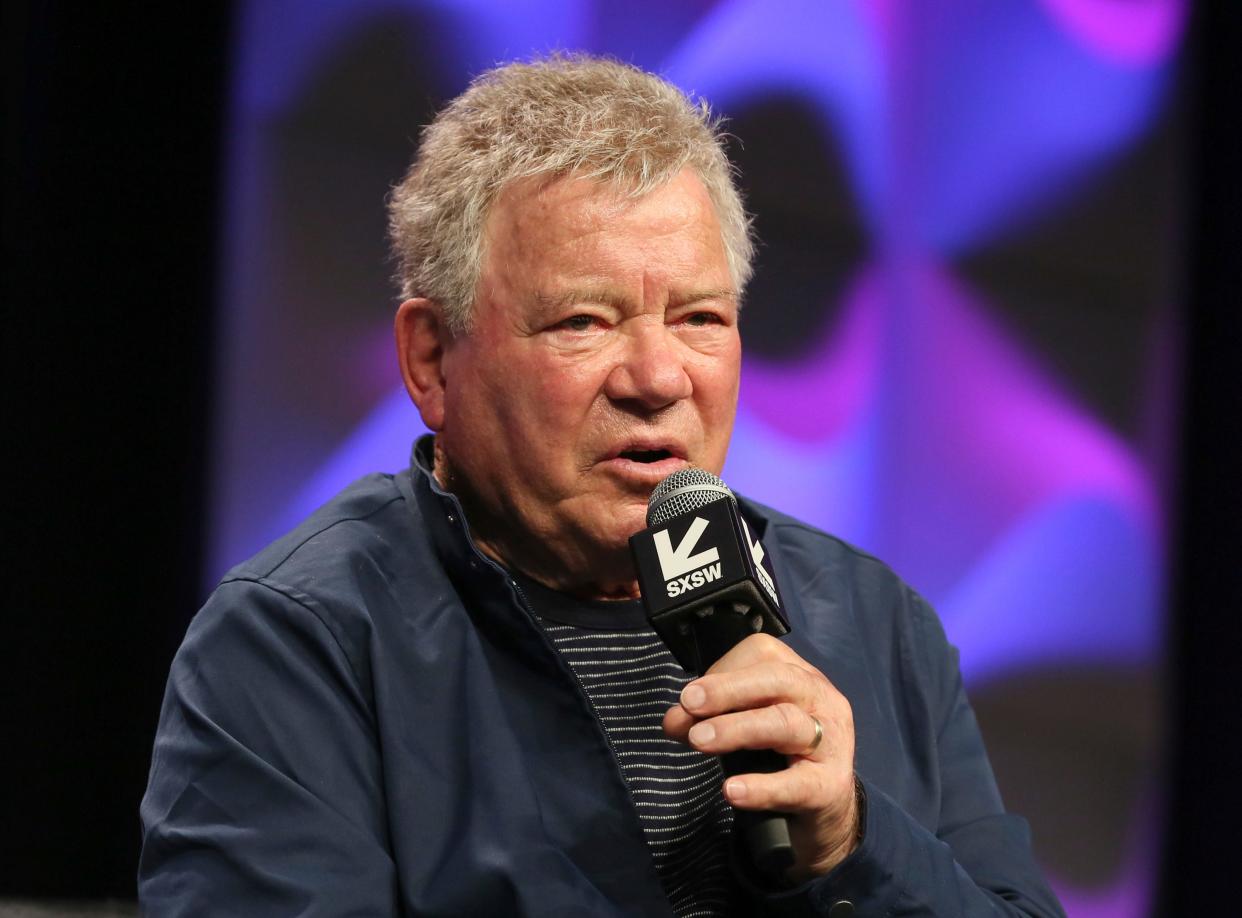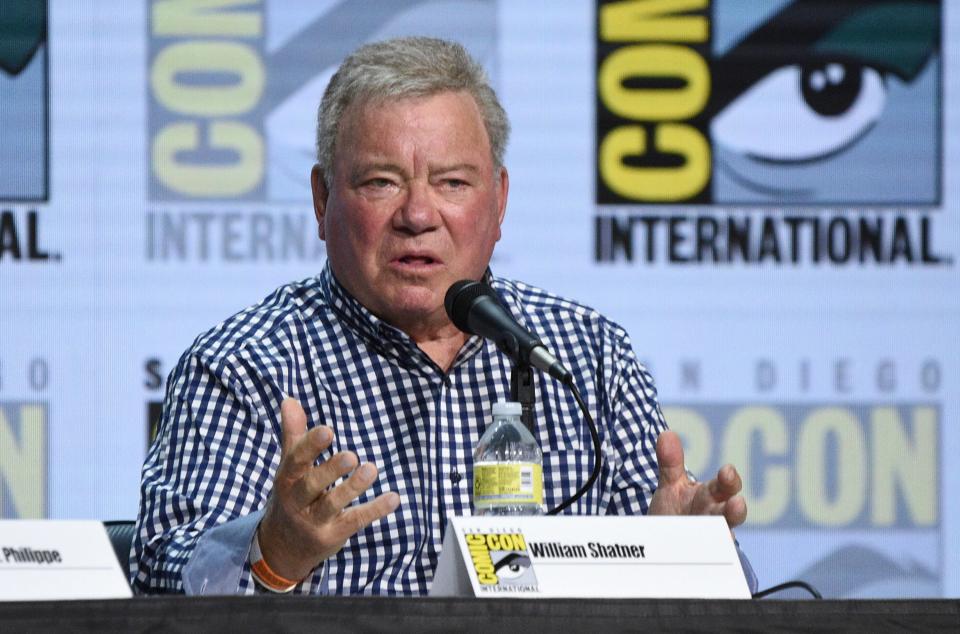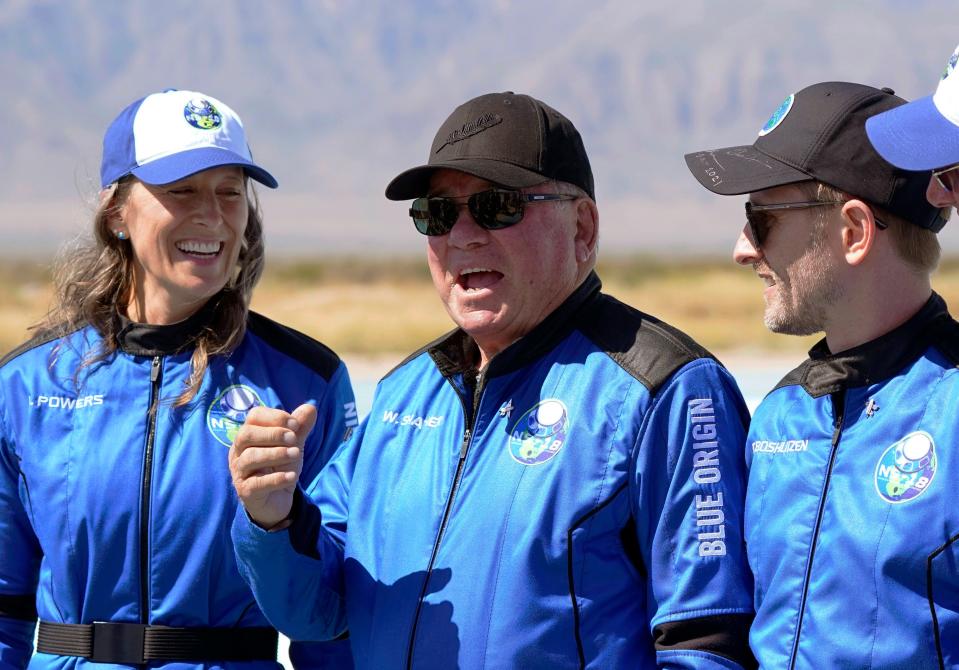William Shatner, 92, says space flight made him realize humans on verge of 'going extinct'

- Oops!Something went wrong.Please try again later.
William Shatner: Wednesday, Nov. 8; Straz Center, 1010 N. Macinnes Place, Tampa; 813-229-7827; strazcenter.org; Thursday, Nov. 9; Au-Rene Theater, 201 SW Fifth Ave., Fort Lauderdale; 954-462-0222; browardcenter.org; Nov. 10; King Center, 3865 N. Wickham Road, Melbourne; 321-242-2219; kingcenter.com; Nov. 11; Van Wezel Performing Arts Hall, 777 N. Tamiami Trail, Sarasota; 941-263-6799; vanwezel.org; Nov. 12; Florida Theatre, 128 E. Forsyth St. #300, Jacksonville; 904-355-2787; floridatheatre.com
From starring in one of the most famous science-fiction franchises of all time, to recently visiting space himself, William Shatner has led a life filled with out-of-this-world — both metaphorically and literally — experiences.
The 92-year-old Shatner will reflect on that life during a tour set to visit Florida cities including Sarasota, Tampa, Jacksonville, Fort Lauderdale and Melbourne, where he will share stories and answer audience questions. The event will also feature a screening of 1982's "Star Trek II: The Wrath of Khan," widely considered to be the best movie in the television and film series that he starred in as James T. Kirk.
Along with his acting career, which has also included playing the titular character on "T.J. Hooker" and an Emmy-winning role as Denny Crane on "The Practice" and "Boston Legal," Shatner is a prolific musician — recently releasing two albums in as many years with 2020's "The Blues" and 2021's "Bill" — and author, including last year's essay collection "Boldly Go: Reflections on a Life of Awe and Wonder." One of the topics he discusses in the book is his 2021 Blue Origin spaceflight, where the then-90-year-old Shatner became the oldest person in space.
Due to the Screen Actors Guild-American Federation of Television and Radio Artists (SAG-AFTRA) strike, Shatner's Oct. 23 phone interview with the Sarasota Herald-Tribune didn't touch on his TV or film acting roles. Yet he was up for talking about any number of other topics, including learning to fly in Florida, visiting space and more. Here are excerpts, edited for brevity and clarity.
100+ more fun things to do in November near Sarasota, Bradenton, Venice and Punta Gorda
Other stars visiting Van Wezel: Biggest concerts, comedians, celebrities coming to Sarasota venue in 2023-24
Ticket Newsletter: Sign up to receive restaurant news and reviews plus info on things to do every Friday
This tour takes you through five Florida cities. Over the years, are there any particular memories of visiting Florida that stand out to you?
Well, I referred to it yesterday, so I'll bring it up because it's fresh in my mind. I was at the (Royal Poinciana Playhouse in Palm Beach); I was appearing at the theater, so that means I was busy every night for five, six nights. I’d wake up in mid-morning and the day was waiting until you’re on stage. There was an airport right next to the hotel, so I wandered over to the airport and found somebody there and I said, ‘Can you give me flying lessons? I’ve got five or six days here, can you solo me in an airplane?’ And it’s what I did — I soloed in that airport during those five or six days that I was appearing at the theater. I took that with me to Los Angeles and Santa Monica Airport, I proceeded to fly out of Santa Monica, have all kinds of extraordinary flying experiences: sailplanes and paramotoring and Pitts Special for aerobatics. I mean, I have done all kinds of flying possibilities that we can take advantage of, and I did take advantage of, and I owe it all to that Florida theater.

I imagine this tour you're on isn't too different from the convention appearances you've made over the years, where you talk to the audience and share stories. Can you talk about what that experience is like compared to performing a one-man show or acting onstage, and are you still able to be surprised by audience questions?
Well, that’s an interesting question. For the most part. As an actor, you're trying to retain the freshness, because it’s that freshness — like the story is appearing to me as it appears to you — that gives it that impulse, that gives it that attention. Because if you tell a story like, 'Then I went, then I...' people, even intuitively, they think, 'Yeah, this happened before.' As opposed to discovering the story for yourself, me as myself, and telling it to you as a discovery, it becomes that much more important, that much more alive. That’s really what acting is all about — to keep that impetus, that 'Wow, I just thought of that!’ feeling that makes you listen. It’s getting the audience to listen to me — ‘I’ve got something really important to tell you that I’m thinking of right now' — it’s that quality that is the magic of storytelling.
In "Boldly Go," you write about how when you went to space, your reaction wasn't what you expected it to be, but rather "among the strongest feelings of grief I have ever encountered."
I read Rachel Carson’s book “Silent Spring” 60 years ago and became influenced by the fact of how badly we’re treating our planet, without any respect. It has become, in the intervening years, an existential occasion. We are on the verge of human beings going extinct — oh, maybe there’ll be a few people living in a cave somewhere in the Rockies — but there’s a good chance that human beings, living the way we are now, will not exist 100 years, 50 years. I mean, terrible things are going to happen, and we’re all burying our heads ignoring it to a degree. We need a huge influx of money and attention to cleaning up the world immediately; otherwise, our children are doomed. I saw it with great clarity of how small our Earth is, and that’s what I saw from space, but the knowledge of what we’re doing to ourselves is out there for anybody who wants to see it. That’s what I most profoundly saw in my voyage into space, and that’s why when I came down, I was weeping uncontrollably and I didn’t know why. I realized I was in grief for our world.

A lot of what you're doing these days — writing "Boldly Go," doing this tour, participating in the documentary "You Can Call Me Bill" — is reflecting on your life, and yet I heard you say in an interview that "There's no legacy." Could you expand on that thought?
The real legacy is good deeds; the real legacy is helping people, and then that person helps somebody else, and that reverberates. Because everything else — your statues, your buildings, your monuments, let alone your tombstone — are tore down, turned to dust, people forget. So my thought is put a tree over me, let me nourish a tree, let the tree grow and I’ll be part of that tree; that’s my legacy. But as for my kids, and my kids’ kids, and down the line, I’m so totally concerned about them. The world is not going to be a happy place, unless we do something about it.
Switching gears, our area is a big market for blues music, and one of your most recent albums was "The Blues," featuring several well-known blues musicians and songs. What was the process making that album and selecting the songs and guest musicians?
I love the blues. Blues is a natural extension of everybody — everybody’s got the blues, and if you can sing them, great. I’ve admired the blues, I talked to blues people about what is the blues, I did a lot of research. Then I got into what songs should I sing, what should I cover. I began to cover these songs, and I had the best time working with these songs and trying to put them in my way. To be able to sing the blues the way great blues singers sing, what a gift! I tried my best. The album went No. 1 on Billboard (Blues Albums chart), I was so surprised and gratified. But it’s my attempt to sing the blues, which in a way is laughable, and another way is an earnest attempt to be feeling the blues.
Is there anything else upcoming you're working on that you can talk about?
I’ve got a lot of stuff. There’s a show called “The UnXplained” on the History Channel; it’s a big hit, and I’m making a lot of hours of that. I’ve got an album of a performance I did at the Kennedy Center; I made a documentary of my performance at the Kennedy Center; one of the numbers I sang at the Kennedy Center was “So Fragile, So Blue,” which is being made into a music video. I’ve got another documentary about me called “You Can Call Me Bill” that’s out there on the movie circuit getting incredible reviews. I’ve got a children’s album I just finished, which is unique in that it’s aimed at 6-to-12-year-olds, singing about the interconnection of human beings with nature. I’ve joined a number of businesses the last couple of years that are so futuristic, it’s unbelievable. There’s a lot more out there, but that’s enough.
Email entertainment reporter Jimmy Geurts at jimmy.geurts@heraldtribune.com. Support local journalism by subscribing.
This article originally appeared on Sarasota Herald-Tribune: Interview: William Shatner on space flight, legacy ahead of Fla. shows

